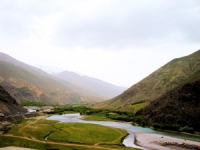Water sharing between Central Asian countries has been conflicting for quite a long time already.
The Politics of Water Institutional Reform in Neopatrimonial States. A Comparative Analysis of Kyrgyzstan and Tajikistan
Author(s):
Sehring, J.
Publication Date:
2009
In many countries, water institutional reforms (like the establishment of water user associations or the introduction of pricing mechanisms) are conducted in order to achieve more sustainable, efficient, and equitable water usage. Often, however, these reforms do not meet their objectives. Based on a comparative analysis of Kyrgyzstan and Tajikistan, this study highlights the long neglected role of politics. It shows how a neopatrimonial regime context impacts the reform process, focusing on the decision making, the agricultural sector, the local governance institutions, internal water-institutional linkages, and the role of international donor agencies.
MONTHLY FOCUS
Poll
Does cooperation on water resources exist in the Amu Darya Basin?
Yes
85% (11 votes)
No
15% (2 votes)
Total votes: 13





